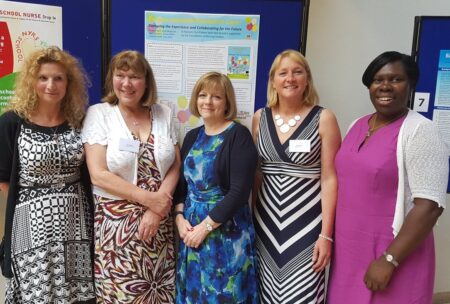Home Resources Project Reports Person-Centred Paediatric Care: Capturing the Experience and Collaborating for the Future
Person-Centred Paediatric Care: Capturing the Experience and Collaborating for the Future
| Leader(s) | Ruth Magowan, Ann Chalmers, Tracey Millin and Chrissie Smith |
| Location | Borders General Hospital |
| Duration | November 2014 – June 2016 |
| Received for Publication | March 2017 |
Aim: This project describes a multi-disciplinary practice development initiative supporting a clinical team to ‘hear’ the voices of children, young people and their families so that person-centred paediatric care might become a sustainable reality.
Background: Person-centred care (PCC) is now a well-recognised health goal for all. Central to this is listening to what matters most to individuals, responding to this and using the learning gained to build a sustainable foundation for future collaboration. Recently, evaluation of the paediatric service in NHS Borders highlighted that there were no effective collaborative mechanisms to involve children, young people and their families in designing, evaluating and planning future care. An application to the Foundation of Nursing Studies Patients First Programme was successful and supported the project.
Design: This work-based project describes an explorative qualitative approach and the use of Experience Based Co-Design (EBCD) and Practice Development approaches in a clinical setting.
Method: The flexibility of these approaches allows the use of creative methods to engage professionals, children and families as active participants to further understand and explore the concept of PCC. The first stage in the EBCD process is ‘capturing the experience’. For the purposes of this person-centred project ‘experience’ is defined as the individual and personal emotions and feelings children and parents encountered on their healthcare journey. Methods of gathering patients’ experiences around their care included workshops, recorded patient stories, diaries, and a storyboard. A film was also made to share these experiences with a wider audience. This work was conducted over a period of 18 months.
Findings: Engaging all relevant stakeholders took longer than expected, but this time allowed the team to reflect on the existing service and gain confidence in the methods used in the project. The project team were able to agree a definition of PCC and create a shared vision. Initial feedback from children has begun to highlight what is important to them. Further work moving the focus from comment about the service provision towards a more person-centred approach has been the development of the “About Me” diaries and the new storyboard on the ward. Analysis of the children’s and parents’ stories has highlighted the disparity between the views of professionals and families towards illness and its impact on the family. Staff were genuinely shocked by some of the comments and reported that they had not appreciated the depth of the children’s and parents’ feelings. The next stage will be the formation of a collaborative working group to work with families to look specifically at different aspects of work together e.g. admission information and preparation for transition to adult services.
Conclusion: The project has enabled a better understanding of the experiences of children, young people and parents and this will be continued by the working group to inform the design of an effective collaborative person-centred model which can be used to shape future paediatric care. It is anticipated that this work will be used to promote person-centred cultures of practice and give children, young people and their families a clear ‘voice,’ and meaningful involvement in their care. This work will form the foundation for more practice development work in this area and ultimately sustainable improvements in the delivery of quality patient care. The collaborative model, if successfully developed, will be shared with other multidisciplinary groups in UK.
This project was supported by the Foundation of Nursing Studies Patients First Programme in partnership with the Burdett Trust for Nursing.
Comments are closed.


